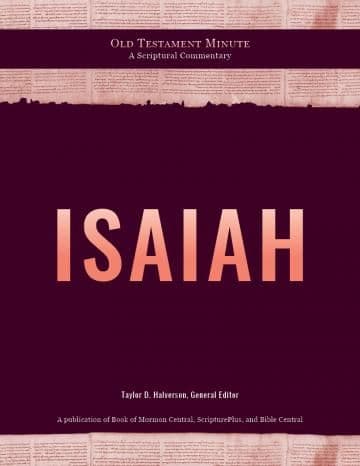Book
34 Chapters

Chapter 29 prophesies in great detail about God’s future plans for the city where David settled, Ariel or Jerusalem.
29:1. Ariel is one word for the altar hearth, which was always burning.
29:2. This verse immediately describes how the Lord will besiege Ariel. “She will mourn and lament; she will be to me like an altar hearth.”
29:3. This verse describes a siege. “I will encamp against you all around; I will encircle you with towers and set up my siege works against you.” It’s a war metaphor.
29:5. Although the besieged city will be destroyed and will speak from the dust, her enemies will be destroyed suddenly and burned like chaff or small dust.
29:7–8. The fight against Ariel will be like a dream in the night when a hungry man dreams that he is eating, but he awakens and his hunger remains.
29:9–10. Describing apostasy, the Joseph Smith Translation reads, “[all ye that do iniquity],” be stunned and amazed, blind yourself and be sightless, be drunk but not from wine, stagger but not from beer. The Joseph Smith Translation explains that those who are amazed are those who do iniquity. See also 2 Nephi 27:5.
29:11. Compare with Joseph Smith—History 1:63–65 (these verses describe Martin Harris).
29:13–14. The Lord quoted this prophecy to Joseph Smith in the First Vision (Joseph Smith—History 1:19).
29:16. This verse says of those above (the people who come near to me with their mouths but their hearts are far from me), “you turn things upside down” and asks the question, “shall the potter be regarded as the clay? Shall the thing made say of its maker, ‘He did not make me?’”
29:18. What day is Isaiah talking about in this verse? Note how in verses 18–20, we read again the metaphor of death and blindness with different verbs (“the deaf will hear the words of the scroll, and out of their gloom and darkness the eyes of the blind will see . . . once more the humble will rejoice in the Lord and the needy will rejoice in the Holy One of Israel.” Notice the parallel expression: Lord is equivalent to the Holy One of Israel.
29:20. The ruthless will vanish, the mockers will disappear, and all who have an eye for evil will be cut down.
29:22–24. “No longer will Israel (Jacob) be ashamed. They will keep my name holy. They will acknowledge the holiness of the Holy One of Jacob and will stand in awe of the God of Israel” (NRSV), humbly acknowledging his honored place in their lives. Each temple we build acknowledges the holiness of the Holy One of Jacob by displaying the words describing the curriculum taught inside: Holiness to the Lord.
Who might this be referring to in our day? Us? Our children?
Chapter 29 ends with a hopeful verse: Those same children who are wayward in spirit will gain understanding. Those who complain will accept instruction.
Book
34 Chapters
Items in the BMC Archive are made publicly available for non-commercial, private use. Inclusion within the BMC Archive does not imply endorsement. Items do not represent the official views of The Church of Jesus Christ of Latter-day Saints or of Book of Mormon Central.